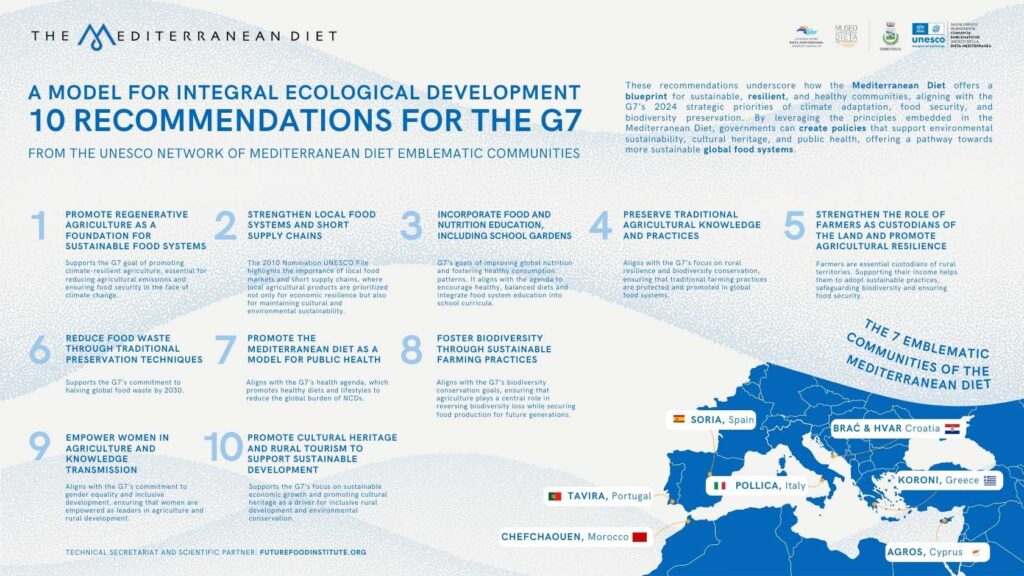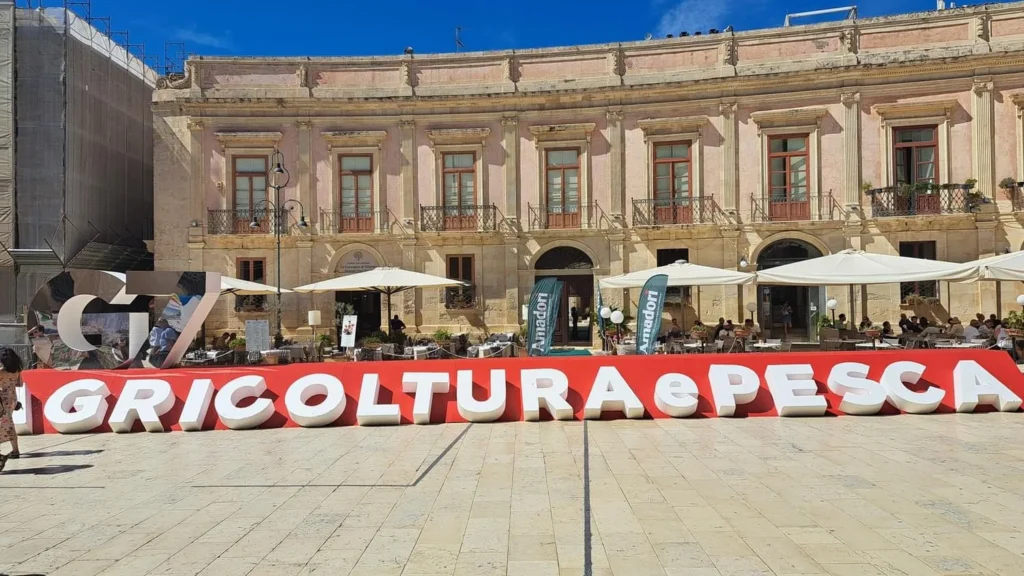Presentation of the 10 Recommendations from the UNESCO Emblematic Communities of the Mediterranean Diet “A Model of Sustainability and Health for Global Agricultural Policies” anticipating the mission for the International Summit “Mediterranean Diet Feeds the Future – The Global Summit to Unleashing the Power of the Mediterranean Diet and Seeding Change from Roots to Future,” which will take place in Portici and Pollica from November 14-17, 2024.
G7 Agriculture, Syracuse – ITALY, September 26, 2024 – During the conference “Mediterranean Diet: A Model of Sustainability and Health for Global Agricultural Policies,” curated by the Future Food Institute, representatives from the UNESCO Emblematic Communities of the Mediterranean Diet presented the 10 Recommendations to the G7. The recommendations were handed over to Minister Lollobrigida by Mayor Stefano Pisani, who leads the Permanent Secretariat of the UNESCO MD Network, highlighting the pivotal role of these communities in promoting a sustainable and healthy future.
The Emblematic Communities of the Mediterranean Diet, distributed across seven countries in the Mediterranean basin, constitute a living mosaic of sustainable traditions and practices. From Koroni and Pylos-Nestor in Greece to the islands of Brač and Hvar in Croatia, from Agros in Cyprus to Pollica in the Italian Cilento, from Chefchaouen in Morocco to Tavira in Portugal, and to Soria in Spain, these communities embody an invaluable cultural and environmental heritage. Their centuries-old experience in sustainable resource management, traditional agricultural practices, and biodiversity preservation offers a concrete and replicable model for guiding future policies toward a more harmonious development that respects the Mediterranean ecosystem.
Representatives from the Emblematic Communities of Italy, Croatia, Greece, and Portugal presented the 10 Recommendations, underscoring their importance for shaping global agricultural policies. Jelena Ivanisevic (Croatia), research associate at the Institute of Ethnology and Folklore Research, Eleni Tagonidi (Greece) from the Maniatakeion Foundation, and Corinne Romeira (Portugal), representing the Municipality of Tavira and presiding over the UNESCO network this year, took part in the event. Stefano Pisani, representing the Italian Emblematic Community and leading the Permanent Secretariat of the MD UNESCO Network, emphasized the pivotal role of these communities in safeguarding and promoting the Mediterranean Diet as a model for sustainability and health.
“The Mediterranean Diet is not just a dietary regimen, but a sustainable development model that can guide us towards a healthier and more resilient future. We propose promoting regenerative agriculture and strengthening local short supply chains, integrating food education. It is fundamental to preserve traditional agricultural knowledge and value the role of farmers as custodians of the territory. We must reduce food waste by rediscovering traditional conservation techniques and promote the Mediterranean Diet as a public health model. Protecting biodiversity through sustainable agricultural practices is crucial, as is supporting the role of women in transmitting this knowledge. Finally, promoting our cultural heritage and sustainable rural tourism can be a driving force for the development of our communities. These concrete actions can transform the Mediterranean Diet from a simple UNESCO heritage to a true model of integral ecological development.” – Stefano Pisani
The 10 Recommendations of the UNESCO Emblematic Communities represent a significant contribution to guiding global agricultural policies towards more sustainable practices, protecting both health and the environment, and reinforcing the Mediterranean Diet’s role as a central pillar in addressing the global challenges of the future. The Mediterranean Diet perfectly embodies the concept of integral ecological development, merging environmental sustainability with social and cultural well-being, making it an exemplary model for global policy.This gathering marked a symbolic and pivotal moment, signifying the beginning of a scientific journey leading to the global summit titled “Mediterranean Diet Feeds the Future – The Global Summit to Unleashing the Power of the Mediterranean Diet and Seeding Change from Roots to Future.” The summit, to be held in Portici and Pollica (SA) from November 14-17, 2024, is organized by the Mediterranean Diet Study Center of the Municipality of Pollica and the Faculty of Agriculture of the University of Naples Federico II in collaboration with the Future Food Institute. This summit will foster targeted scientific dialogue, exploring the Mediterranean Diet’s potential as a global model for sustainable and healthy development.


